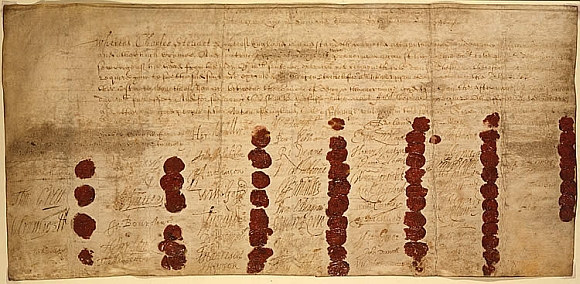How does American law propose to treat an executive who authorizes or condones the torture of a prisoner in time of war? The precedent is clear, and it is a matter of our nation’s proto-constitutional history–back to 1649.
In that case, the executive stood accused that he, “contrary to laws temporal and divine,” had made war, and in the course of his war-making had authorized or indulged the torture of prisoners taken captive by his forces.
On January 25, the prosecution called two witnesses who testified that the executive had stood by and looked on approvingly as prisoners were beaten. And a further witness said that he saw the executive, mounted on his horse in Fowey in Cornwall, gazing from his horse as prisoners were stripped naked and mistreated, all in violation of the laws of nations. A fourth witness was called. At Newark Fort, near Leicester, he said, the executive commanded his troops as they took surrender of the fort by agreement, and in the executive’s presence, his troops fell upon the surrendered prisoners, stripped them naked and proceeded to beat, cut, and mistreat them, in violation of the laws of nations. An officer ordered them to stop, but the executive, sitting “on horseback in bright armour” ordered them to continue with their beatings, saying “I do not care if they cut them three times more, for they are mine enemies.”
The charge, repeated the prosecutor, was that the executive had violated the laws of nations in that he authorized or indulged the torture and brutal mistreatment of prisoners taken in wartime. The commissioners deliberated and rendered their verdict: The charge against the defendant was sustained, the defendant was guilty as charged. And then the punishment was fixed. How does one punish an executive for violation of the laws of nations by authorizing the torture of prisoners? The verdict was that he be taken to a place of execution, where his head was to be severed from his body by an axe.

Yesterday in the course of a televised interview, George W. Bush acknowledged that he personally authorized the torture of at least one prisoner. Watch the confession here:
Note that Bush carefully predicates his decision on the advice he received from his legal team headed by Alberto Gonzales, with key legal research done by John Yoo. His defense will be reliance on counsel. Will he, like Charles Stuart, be held to account?


